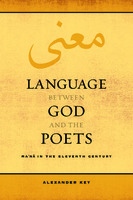Language Between God and the Poets
maʿnā in the eleventh century
Abstract
How does language work? How does language produce truth and beauty? Eleventh-century Arabic scholarship has detailed answers to these universal questions. Language Between God and the Poets reads the theory of four major scholars and asks how the conceptual vocabulary they shared enabled them to create theory in lexicography, theology, logic, and poetics. Their ideas engaged God and poetry at the nexus of language, mind, and reality. Their core conceptual vocabulary carved reality at the joints in a manner quite different from Anglophone and European thought in any period. This vocabulary centered around the words maʿnā (“mental content”) and ḥaqīqah (“accuracy”), two concepts for which Alexander Key develops a translation methodology with the help of Wittgenstein and Kuhn. Language Between God and the Poets helps us see how fundamental the lexicon and lexicography can be to all kinds of theory, how theology can be a science of naming, how logic interacts with language, and how poetic affect can be built on grammar and logic. The four scholars are ar-Rāġib al-Iṣfahānī, Ibn Fūrak, Ibn Sīnā (Avicenna), and ʿAbd al-Qāhir al-Ǧurǧānī.
Keywords
Arabic; Translation; Literary Criticism; Philosophy of Language; Conceptual Vocabulary; Mental Content; Avicenna; Epistemology; God; Haqiqa; Lexicon; Logic; Mind; QuranDOI
10.1525/luminos.54ISBN
9780520298019OCN
1076726834Publisher
University of California PressPublisher website
https://www.ucpress.edu/Publication date and place
Oakland, 2018Series
Berkeley Series in Postclassical Islamic Scholarship, 2Classification
Literary studies: ancient, classical and medieval
History and Archaeology
CE period up to c 1500
Philosophy
Islam


 Download
Download